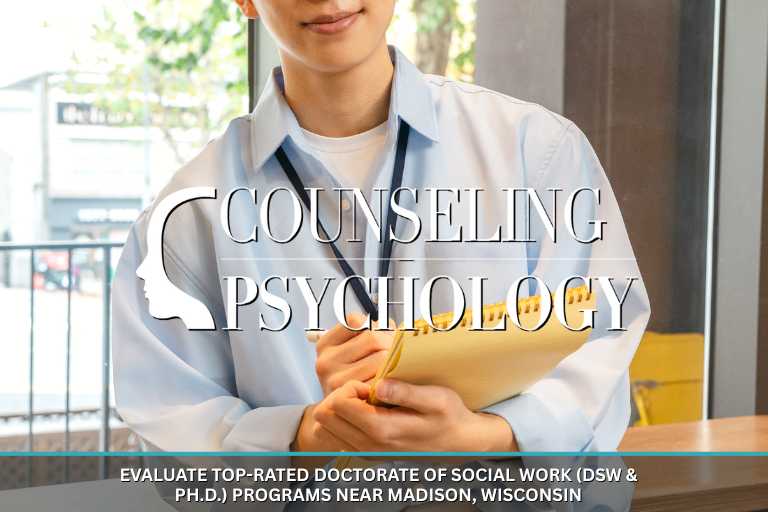Search Top Doctorate of Social Work (DSW & Ph.D.) Programs Near Madison, Wisconsin

Madison, Wisconsin, is a hub of progressive policy, public health innovation, and community social initiatives, and a city deeply engaged in statewide mental health efforts led by agencies like the Wisconsin Department of Health Services. For experienced social workers looking to advance their impact through research, leadership, or clinical expertise, pursuing a Doctorate of Social Work (DSW) or Ph.D. in Social Work degree near Madison offers an ideal environment for scholarly and professional growth.
With its blend of academic institutions, public agencies, and advocacy networks, Madison provides a strong infrastructure for doctoral fieldwork and research collaboration supported by organizations, such as the National Association of Social Workers – Wisconsin Chapter. Whether the goal is to influence systems through data driven policy analysis or to teach the next generation of social workers, a doctoral program in this region can be a transformative next step.
2026 Top Rated Doctorate of Social Work (DSW & Ph.D.) Programs Near Madison, Wisconsin
University of Wisconsin-Madison
Madison, WI - Public 4-Year - wisc.edu
Doctorate - Social Welfare, PhD
Campus Based - Visit Website
The University of Wisconsin-Madison's PhD Program in Social Welfare distinguishes itself through comprehensive interdisciplinary research training targeting emerging social work scholars. Distinguished by robust financial support mechanisms including graduate assistantships, tuition remission, and health insurance, the program cultivates advanced research skills in social problems, social science theory, and sophisticated methodological approaches. Uniquely structured to accommodate both MSW and non-MSW backgrounds, students engage with renowned research centers while developing individualized study plans. The program's commitment to equity, inclusion, and scholarly excellence prepares graduates for leadership roles in academic, policy, and research environments, with strong mentorship and opportunities for conference funding and dissertation research support.
- Interdisciplinary research training
- Collaborations with top research centers
- Substantial financial support
- Graduate assistantships available
- Tuition remission benefits
- Health insurance eligibility
- Statistics course required
- 30 social science credits needed
- Tracks for MSW and non-MSW holders
- Focus on social problems
Understanding the Difference: DSW vs. Ph.D. in Social Work
Prospective students near Madison looking to advance beyond an MSW will encounter two distinct doctoral pathways:
- Doctor of Social Work (DSW): A practice-oriented degree focused on advanced clinical practice, executive leadership, or applied innovation within social work settings. Often designed for working professionals.
- Doctor of Philosophy (Ph.D.) in Social Work: A research intensive degree emphasizing theory, original research, and academic scholarship. Typically prepares graduates for roles in academia, research institutions, and policy analysis, as highlighted by labor market trends reported by the U.S. Bureau of Labor Statistics.
While both are terminal degrees, choosing the right path depends on long-term goals, whether focused on field leadership or academic research.
Why Madison's Ecosystem Fuels Doctoral Social Work Innovation
Madison combines the resources of a policy-driven capital with the culture of collaboration found in smaller cities. Known for its progressive values, it serves as a living lab for social innovation where doctoral students can test interventions, influence public policy, and engage with diverse populations ranging from urban youth to rural elders. These relationships don't just support learning; they generate ripple effects across Wisconsin's social service landscape.
Specializations and Scholarship Rooted in Wisconsin's Social Landscape
Both DSW and Ph.D. programs near Madison emphasize a rigorous foundation in advanced social work knowledge. Key areas of focus often include:
- Research Methods & Statistics: Qualitative and quantitative methods, program evaluation, and data analysis
- Social Policy and Systems Theory: Deep dives into policy development, implementation, and systemic inequities
- Leadership in Human Services: For DSW students seeking organizational or executive roles
- Specialized Electives: Topics such as trauma-informed care, gerontology, child welfare, criminal justice reform, or rural practice
- Dissertation or Capstone Project: Original research or applied innovation that contributes to the field
Students can often tailor their coursework and dissertation topics to align with Wisconsin needs, such as opioid recovery, school mental health, or tribal community development.
Local Practice Meets Scholarly Rigor in the Field
Practice-based opportunities vary depending on the program path, but many doctoral students are actively involved in:
- Program Design and Evaluation: Partnering with local nonprofits to assess impact and improve services
- Clinical Supervision: Providing advanced guidance to MSW degree practitioners or interns
- Policy Research Fellowships: Collaborating with state agencies or think tanks to influence social policy
- Community Participatory Research: Co-developing studies with marginalized populations in Madison's urban and rural corridors
These opportunities ensure that coursework translates directly into leadership, research, and advocacy in Wisconsin's communities.
Funding, Fellowships, and Cost Considerations
While doctoral education requires a significant investment of time and resources, many top-rated programs near Madison offer:
- Research or Teaching Assistantships: Cover tuition and provide stipends in exchange for academic service
- Fellowships and Grants: Awarded based on merit, research focus, or commitment to underserved populations
- Employer Sponsorship or Tuition Reimbursement: Available for some working professionals
- Public Service Loan Forgiveness (PSLF): For graduates working in qualifying nonprofit or public sector roles
Candidates are encouraged to compare funding structures across institutions and consider both direct costs and long-term earning potential.
What a DSW or Ph.D. from Madison Can Help You Achieve
Graduates of DSW and Ph.D. programs in the Madison area are equipped for a variety of advanced roles:
| Role | Description |
| University Faculty or Researchers | Teaching and publishing in accredited social work programs |
| Agency Directors or Executives | Leading nonprofits, behavioral health networks, or human services departments |
| Clinical Specialists or Trainers | Developing and delivering advanced practice models |
| Policy Analysts and Advocates | Shaping laws and regulations that affect vulnerable populations |
Wisconsin's investment in mental health expansion, school services, and integrated care models creates a strong demand for doctoral professionals who can lead both practice and policy innovation.
How to Choose the Right Doctoral Program in Madison
Before selecting a DSW or Ph.D. program, prospective students should consider:
- Accreditation and Program Reputation: Ensure the program is housed within a regionally accredited institution and, if applicable, aligns with the standards of the Council on Social Work Education (CSWE) or other relevant academic bodies. A strong reputation can influence future academic or leadership opportunities.
- Delivery Format: Programs may be offered in various formats, including in-person, hybrid, or fully online, to accommodate different learning styles and life circumstances. Prospective students should evaluate whether a format supports consistent engagement, faculty access, and fieldwork integration.
- Faculty Expertise: Review faculty bios and research portfolios to ensure alignment with areas of interest. Whether pursuing a dissertation in rural behavioral health or a capstone in trauma-informed leadership, mentorship from faculty with aligned expertise is essential.
- Cohort Size and Mentorship Model: Smaller cohorts often promote deeper peer collaboration and individualized faculty mentorship. Some programs offer structured advising models, while others focus on student-led research communities.
- Dissertation or Capstone Support: Investigate how the program supports the final research project. Consider the availability of research resources, access to advisors, IRB navigation, and opportunities to publish or present findings.
Exploring faculty publications, talking with current students, and attending information sessions can help applicants make informed decisions. For those driven to lead, teach, and transform social systems, a social work degree program in Madison offers more than advanced credentials; it provides a launchpad for bold, evidence-based change in communities across Wisconsin and beyond.
Sources
- Council on Social Work Education (CSWE)
- National Association of Social Workers: Wisconsin Chapter
- Public Service Loan Forgiveness (PSLF)
- U.S. Bureau of Labor Statistics: Social Workers
- Wisconsin Department of Health Services: Mental Health Programs



